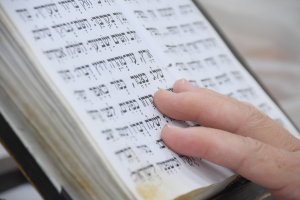As we shall see, your question was addressed by the Almighty Himself!
Jeremiah the prophet says in the name of G-d: “…And it shall be that when you relate all these things to this people, they will say to you, ‘Why has God spoken all this great evil against us? What is our iniquity, what is our transgression that we have transgressed before Hashem our God? Say to them: ‘It is because your forefathers have forsaken Me – the word of God – and they followed the gods of others; they worshiped them…but Me, they have foresaken; and My Torah they did not observe.’’
The sages note the seeming redundancy at the end of this verse; obviously if we forsook G-d, we did not observe His Torah?! What is Jeremiah telling us?
The Talmud answers, the Almighty meant to say, “Halevay (I only wish) that Myself they have foresaken (by not observing the mitzvos), but they continued to study My Torah, because the illumination within it (the Torah) would eventually bring them back to Me.”
The Talmud states further, based upon another verse, that the Almighty told the Jews “I’m willing to pardon you for the transgression of the three cardinal sins; murder, idol worship and forbidden relations, but your forsaking the study of Torah I can not forgive,” as the study of Torah is G-d’s final hope for the Jews’ connection to Him and for them to return to Him.
As we see, the Almighty Himself has proclaimed that no matter how far a Jew is from observance, His desire is that each and every Jew should be involved in the study of Torah. Torah study, more than the observance of any mitzvah, is the key to Jewish continuity.
The communists understood this well when they banned the study of Torah. A rabbi once visited communist Russia, as a “tourist.” Stopped by customs, they unloaded his suitcases, taking out numerous pairs of tefillin, mezuzos, tallis and the like, in addition to many volumes of Torah. The officials smirked at him, saying “tourist, huh?!” They then returned to him all the religious paraphernalia, but held back the Jewish books. They said, “…we keep these, these are the enemies of the people”!
The Communists recognized and comprehended that without Torah study, the mitzvah observances this rabbi was bringing them would be short-lived and would not win the people over from their communist ideology. Torah study, however, would give the Jews knowledge and pride, and thus give the people the inner strength to stand up to their ideologies, creating “enemies of the people.”
The Russians learned this lesson from the Greeks and Romans of old who first enacted decrees to forbid the Jews from study, punishable by death. The miracle of Chanukah was the celebration of the Jews steadfast commitment to learning, the “light within the Torah” represented by the Menorah and overcoming the darkness of those decrees.
Judaism, furthermore, does not believe that “what you don’t know doesn’t hurt you.” When we have the opportunity to learn and know, we are responsible for what we could and should have known even though we may choose not to know. To choose to not study lest one finds out something she is not willing (at this point) to observe is not a reason to refrain from study. On the contrary, besides not knowing that item, one becomes liable for not studying!
Moreover, you should not think you are worse off for knowing about shrimp and not refraining from consuming it (although I’m not condoning shrimp!). By virtue of the Torah study, you are no longer the same person you were before; you have taken a tremendous step ahead in your Jewish identity and connection with G-d. In the new space you inhabit, at least shrimp is now a question. This is a remarkably elevated space to live in than to remain in a zone where it is not even a topic of concern!
You should be proud of what you have achieved. Always look out for the next small, meaningful step that you can take. This is because all Jews, regardless of age, background or affiliation, need to always be climbing and growing – throughout our lives – to become better, greater Jews and people.
Sincerely,
Rabbi Yerachmiel Fried

